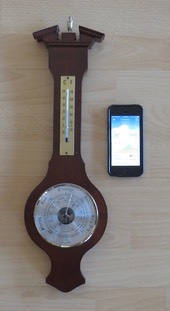In a world that values things that are new, we so easily forget the old. There are many aspects of the past that are good to move on from; but forgetting is dangerous too. It makes us blind, because we try to get by without the wisdom learned from past mistakes.

A combined barometer and thermometer hung on the wall in my parent’s home for many years. It isn’t particularly old, but it stands in the line of instruments made by craftsmen, designed to look good as well as to be useful. Today it hangs on the wall in my home, and it works, but we never actually refer to it.
We don’t need to use it, because full details of the weather are instantly available on smartphones and computer screens. Smartphones haven’t been around very long, really, but I would feel a great loss if mine was taken away! Yet the current one has no link to the past. There have been others before it, and there will be others afterwards. Even the most beautiful smartphone will not last. The barometer, on the other hand, still looks good; it needs no batteries, does not demand attention, and stands for an age gone by. It brings back memories of another time and another place.
In the bigger picture, barometers are quite recent too. We have records from Sumeria dating back five millenia, and of course there are artifacts around the world going back much further than that. Barometers were invented less than five centuries years ago, so they are still quite newfangled really! And the thing they measure, atmospheric pressure, remains important for weather forecasting.
It seems to me that today, most people don’t want to spend time listening to the past. Things that are old have no news value, and won’t sell ads, unless they open the possibility of controversy. But this is a dangerous way to live: if we forget the past, we forget the lessons of the past. Medicine has made plagues and epidemics rare today: so we forget the lesson, and worry whether vaccination is a good thing. High-tech military expeditions go into areas that have brought disaster in centuries gone by, and suffer. Employees are treated as 'assets’ and not people by companies, so loyalty is lost. Children are pressured to aim high and do well academically, and leave school not knowing how to fit into the wider world where most of us never get to the top. Those who have innate skills that do not fit current expectations are left by the wayside. Those who would seek our help are ignored or punished. A sense of humanity goes missing because someone else, somewhere else, can save or make more money that way. We have forgotten what wise leadership looks like.
History has a way of being dry and unexciting, but if we approach it by looking at and entering into the lives of those who made it, rather than as dates and battles, we can be inspired by it.
I want to go a step further: the ancient, foundational stories of our civilisation are also inspiring, if we are willing to immerse ourselves in them, using imagination, rather than just looking at them as if in a museum. There are stories of a flood that come from many parts of the Middle East, that parallel the story of Noah in the Bible. What was it like to be in an overwhelming flood? There are many today who can relate to that! Drought, plague, warfare - our ancestors survived them all, and rather than getting gloomy because of what it happening today, we can reflect on their stories and what worked for them, and choose a better way to live.
And another step further: call it primitive if you wish, but our ancestors perceived greater powers, and were motivated by them. It’s fashionable today only to see the negative side of this: warfare, cruelty, misogyny in the name of a god or gods. But is that so different to what happens today in the name of profit or power? Then, as now, good news was usually ignored. Much good has come about because people believed in some power beyond themselves. As our race matured, the idea of a single god came about, although our ability to understand what that god might be like was (and is) limited by our own experience and language. If all we know is warfare, we need a warrior god. More recently, the idea that the one God might actually be benign and caring has given rise to much good. This God draws us on to do greater good. When the Roman Emperor Julian tried to turn the recently-Christianised Empire back to paganism in the mid-fourth century, he complained that the rotten Christians were spoiling things by looking after pagans who were sick as well as their own people! But we have forgotten this too, and we are all the poorer. God shares our pain, and waits for us to turn again; to remember, among all our novelty, that wisdom doesn’t conform to today’s ways. We can find out more about it if we study antiquity as well as novelty.
It seems to me that Jesus' story of the Prodigal Son is one for our time: We have sold our inheritance and gone off on our own, denying wisdom and position because we want to be number one, and now! And now we are experiencing the consequences of waste. Obsessed with the delights of technological progress, we have ignored our our history and still think we can make it through without the benefit of past wisdom. Meanwhile, God is waiting patiently for our return, not to rules and regulations but to a party!
— Steve Jackson

